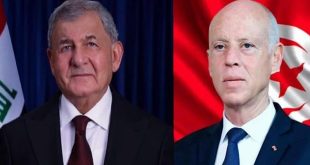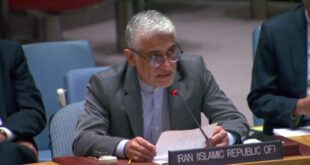Damascus, SANA – Deputy Prime Minister, Foreign and Expatriates Minister Walid al-Moallem and Iraqi Foreign Minister Ibrahim al-Jaafari held a press conference on Tuesday at Damascus International Airport prior to al-Jaafari’s departure from Damascus.
Al-Jaafari said his visit to Damascus is part of the efforts to strengthen relations between Iraq and other countries, particularly neighboring countries, underlining the historical and geographic ties and mutual interests that bind Iraq and Syria together.
He noted that whenever the world turned its back on Iraqis, Syria was there to embrace them, saying “we will never forget those who stand by our people and defend our security and theirs and our sovereignty and theirs.”
“Today, relations rose to the level of the strategies and the mutual threat that is targeting Syria and Iraq and that looms in other areas in the world,” he said, adding that today’s meeting is an expression of the social structures that are responding to the threat of ISIS.
Al-Jaafari thanked President Bashar al-Assad for receiving him and for al-Moallem’s invitation to visit Damascus.
“The world is now beginning to understand the threat of ISIS after a long slumber and after thinking that it was merely an Iraqi and Syrian phenomenon, only for it to turn out to be otherwise; the whole world today is threatened by terrorism,” he said.
The Minister said that Syria, in its fight against terrorism, is defending all neighboring countries, and that Syria and Iraq are the first line of defense against terrorism, hoping that the region’s countries will understand the vital role played by Syria and Iraq in this regard.
Al-Jaafari also lauded the Syrian government’s efforts to push forward with the political process and cooperate with the opposition.
On the level of coordination between the two countries, al-Jaafari hoped that it will improve beyond the current level and that this visit will pave the way towards that.
Regarding the visit of Iraqi Prime Minister Haider al-Abadi to Washington, al-Jaafari said that talks during that visit will focus on Iraq issues firstly, Syrian issues secondly, then Arab and international issues, adding that the Syrian issue is important to Iraq due to the mutual threat to them posed by terrorism, and so it’s natural for it to discuss it in ever venue.
On security cooperation, al-Jaafari said there are many prospects for it because war on terrorism is different from conventional warfare, and information and intelligence plays a vital role in it.
Regarding Iraq’s position on some voices calling for giving Syria’s seat in the Arab League to the Doha Coalition, the Iraqi Minister said that this is an issue that Syria should decide upon as each state selects those who represent it, and this is one of the articles of the Arab League charter.
On Arab support for Iraq and Syria in the battle against ISIS, al-Jaafari said that there’s a degree of support for Iraq in this regard, but no such support was given to Syria, adding “there’s no difference between Syrian and Iraqi citizens and Syrian or Iraqi children from the humanitarian viewpoint.”
He hoped that Arab countries would be more helpful , adding that it’s odd for geographically-distant countries to be more helpful than neighboring countries.
Moving on to some neighboring countries’ responsibility for the terrorism affecting Syria, al-Jaafari said that states should defend neighboring countries when they are threatened out of values and a sense of responsibility as well as interests, asserting that Iraq stressed the need to prevent the sneaking of terrorists across borders as well as the need for states to refrain from providing moral and media support to terrorists and from allowing them to use their territories to train or move.
“It is odd to have any neighboring country feeling at ease with terrorism that burns the living, murders children, and violates underage girls… how can they be at ease and feel safe from terrorism that is indiscriminate towards people?” he said.
For his part, Minister al-Moallem said Syria and Iraq stand in the same trench against terrorism.
“Whenever Iraq is okay, Syria is okay too, and that’s why we are deeply confident that the Iraqi leaders have never spared any efforts to support Syria and help break the siege imposed on it,” he added.
Commenting on statements made by the Jordanian Information Minister that Amman is training Syrian tribes on the Jordanian territory, al-Moallem said the statements did not come up with anything new, “except that they prove what we have been saying about the existence of training camps for terrorists in Jordan.”
He said that Syria and Iraq are on the same page and have a clear goal, but sadly some Arab states employ double syandards, commenting on the statement of Saudi Foreign Minister Saud al-Faisal on the so-called moderate opposition that the U.S. is trying to promote, saying “I say that all those who bear arms against the Syrian state’s establishment are terrorists.
“Saud al-Faisal said that President al-Assad has no future… this is a joke. He’s speaking on behalf of the Syrian people. Since when? This is why I say this is a joke,” he added.
On Egypt’s position regarding what is happening in the region, al-Moallem hoped that Egypt will live up to its historical role and fulfill its duty towards the Arab world, noting that this hasn’t happened yet may due to personal considerations or because it’s embroiled in its own battle against terrorism and the Muslim Brotherhood.
“We sympathize with the Egyptian people… history proved that Egypt and Syria – and today Iraq – can change the course of the events in the region,” he added.
On the upcoming Moscow 2 meeting due to be held in April, al-Moallem said that in the last communiqué with the Russian side, the Syrian government didn’t make any conditions for the meeting; rather President al-Assad informed the Russians that Syria will exert every possible effort to ensure its success, so the Russian Foreign Ministry will be the one issuing invites to opposition figures.
“We’re open and we will attend, as for the level of presentation in the Syrian government delegation, that is up to President al-Assad to decide,” he concluded.
Earlier, Minister al-Moallem and Deputy Foreign and Expatriates Minister Fayssal Mikdad held meetings with al-Jaafari upon his arrival in Damascus.
Haifa Said / Hazem Sabbagh
 Syrian Arab News Agency S A N A
Syrian Arab News Agency S A N A







